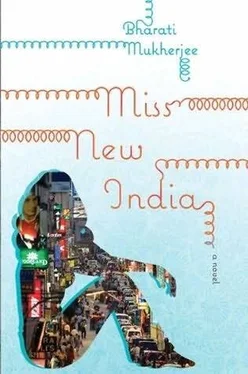He stood, shook hands with Auro, bowed to Parvati, patted Malhar's head, and nodded in Anjali's direction.
WHEN SHE WENT up to her bedroom, she remembered the letter from Peter. Maybe it wasn't a continuation of the argument they'd had at Minnie's.
Peter's handwriting was feathery light.
My dear Angie, I am ashamed of how I behaved in Bangalore. You have endured aspects of this beloved country that expats and refugees have been spared. I was too categorical and overbearing. Smugly superior, whatever you might call it-I apologize. Your father's passing is very much on my mind. Life is too short, death too sudden to behave with anything but affection and gratitude.
Your father's passing tells a mighty, and a humbling tale. The persistence of colonial castes like "sub-inspectors," the deputies and the assistants that the Indian system inherited and then respawned, and the stubborn dignity of the so-called "little man" makes me weep. (I've been weeping quite copiously these past several days.) There is such a tone of bent-back dignity to his "steadfast" and "unyielding" life (in the words of the obituary notice), of never quite rising to a position of leadership, and the unending dedication to duty, duty, duty. No mention of joy, fulfillment, or happiness-it's heroic.
I think of the millions of men in India like your father who still bicycle to work or ride the buses and commuter trains each morning, rooted to the town and the vocation of their fathers and grandfathers. They shuffle papers, drink endless cups of tea, stamp documents, then make their same way back home at the same time each working day of their lives. Places have been found for them, in the millions, and should any one of them pass on, the system would not grind to a halt. And yet, as the playwright said, "Attention must be paid." To understand what's noble in India is to understand that their lives coexist with yours and millions like it in a dozen other new-age Bangalores. I hope you read this as I intend it, not as questioning of your father's achievement in life but as the fulfillment of all that his life and his vision offered him.
I have talked on the phone to your sister and have faith that in time your mother will acknowledge, at least to herself, why you had to run away from home. That time has not yet come. Your sister will keep me informed of her physical and emotional health with the understanding that I will relay the information to you.
On a different subject (forgive me if I'm being presumptuous): You were wronged by the man your father selected. Believe me, dear Angie, I had not meant it literally when I said that your formal marriage portrait would only fetch up monsters. Last week I read of a man (his picture accompanied the story) who had been arrested as a criminal imposter. He has been able to swindle dowry gifts from anxious fathers and much else from their daughters. One of the fathers (unnamed) swore out a warrant. It was mentioned that Gauripur was one place he visited. If this is so, your father must have understood the full story behind your leaving. That man is now in jail. He is an embodiment of another aspect of the New and Old India in one criminal soul.
I too have gone through a lifetime's change in the past few days. You remember Ali (how could you not?). Well, he is gone, along with a sizable portion of my savings. It was his dream that he undergo a certain dangerous and expensive surgery. But from street gossip I hear it went badly for him. Now I fear for his very life. The mutilation of so beautiful a creation is a nightmare from which I'll never awake.
So, to honor him, or at least to honor the changes he brought about, I'm trying not to slip back into my old solitary habits. The flowerpots still light up the steps, bright calendars still hang from the walls, and books are neatly lined in cases. Almost in a daze I seem to find flowers to put on the table at night, and somewhere I found a bright bedspread to cover the mattress. If you ever come back to Gauripur for a short visit or resettlement I hope you'll make your first call a visit to your old friend and teacher, Peter.
P.S. You and Ali are the only two people in decades to have pierced my shell. I wanted to be an instrument in your salvation (to put a high gloss on my interventions); with Ali, my interference might prove self-defeating, if not fatal. I pray that your activities in Bangalore will redeem my clumsy but well-intentioned encouragement, as well as Ali's impulsive embrace of his life's dream.
Peter
Suddenly she was back in Gauripur. It was again the day she'd visited Peter Champion to show him her marriage portrait, and Peter had said she was dead to him if she married. "Weak and weary," she kept repeating. "Ray-venn." He called the portrait somehow obscene. Still holding it, she'd started walking back home, fighting tears, but had found herself walking past the da Gama campus. And she was sobbing again. Let Swati eavesdrop on the howls and growls of a woman breaking down. The tears were for Peter, who still cared for his protégée, and for her father, who, in his clumsy way, had cared too much for the rebel daughter.
In the garden next door, Citibank Srinivasan of the booming voice exhorted elephant-headed God Ganesha, son of Goddess Parvati, to liberate all mortals from the tormenting cycle of reincarnation. In the kitchen Swati and her sister cooked lunch and prepped dinner for the Banerjis, drop-in guests, and household staff. And in a Gauripur sparkly with Anjali's tears, "Railways Bose" lounged, whiskey in hand, feet propped on a low morah, enrapturing Mrs. Bose with his harangue on statewide graft and greed, and Angie dreamed up a perfect groom.
And then he picks up the newspaper, left over from the morning. There is a picture of a boy he remembers, and an article. What? Is he getting married? What? Is he so famous, his exploits merit the front page? But it is a police report, and the accusations against him are enough to rip a father's heart to pieces.
"Oh, Anjali," he cries, "I didn't know. Why didn't you tell me? I would not have been compelled to do what I now must do."
Mr. GG delivered on all his promises. Mr. GG's MBA classmate, Mr. K. K. Jagtiani, director of the HR division at RecoverySys, had his personal assistant, Mrs. Melwani, call Anjali on the Banerjis' land line. Would Miss Bose care to have Mrs. Melwani initiate the setting up of "a chat" with Mr.D. K.Jagtiani, the deputy in charge of human resources (a younger brother of Mr. K. K., she assumed, in a Sindhi-owned business, if family names are any indication), to take place after his return from his business trip to California and Michigan? If so, Mrs. Melwani would request Mr.D. K. Jagtiani's personal assistant, Miss Lalwani, to get in touch directly with Miss Bose to squeeze her into his calendar.
In the Bose family hierarchy of Indian groups to avoid all dealings with, Sindhis usually ranked near the top.
Anjali summoned all of her "phone poise." "Certainly, if I am still available then," she said. "And I'd prefer Miss Lalwani to call me on my cell phone. Let me give you that number."
Mrs. Melwani stopped her. "Not to worry; we have it on file. Telephone numbers, current address, résumé."
Résumé? She had no job experience. Mr. GG must have taken liberties with truth when he'd pitched her to his friend. If Miss Lalwani called to set up the meeting with her boss, she would instruct her to spell her first name as Anjolie. A day could start with guilt and grief but end in hope. Let Citibank Srinivasan aim for nirvana; she was happy to be mired in maya.
PARVATI OFFERED TO coach Anjali for the upcoming interview. If the delinquent debtors were like Thelma Whitehead, her fictitious caller from Arkansas, they would probably resent being dunned by an agent with a detectable Indian accent. She sounded excited. "Thanks for alerting CCI to this brand-new outlet. Debt recovery, how exciting." Anjali would be her guinea pig for a training manual for pay-up-or-else phone specialists. For RecoverySys, Anjali's voice would have to project authority. Start with compassionate authority, shift to credit-score damage, then to legal intimidation. Parvati had met K. K. Jagtiani at a couple of fund-raisers, she added, but not his son or cousin or brother, D. K. Jagtiani. At the time of their meeting, Mr. K. K. Jagtiani had been exploring an intercontinental cremation-and-ash-scattering service for overseas Indians.
Читать дальше












